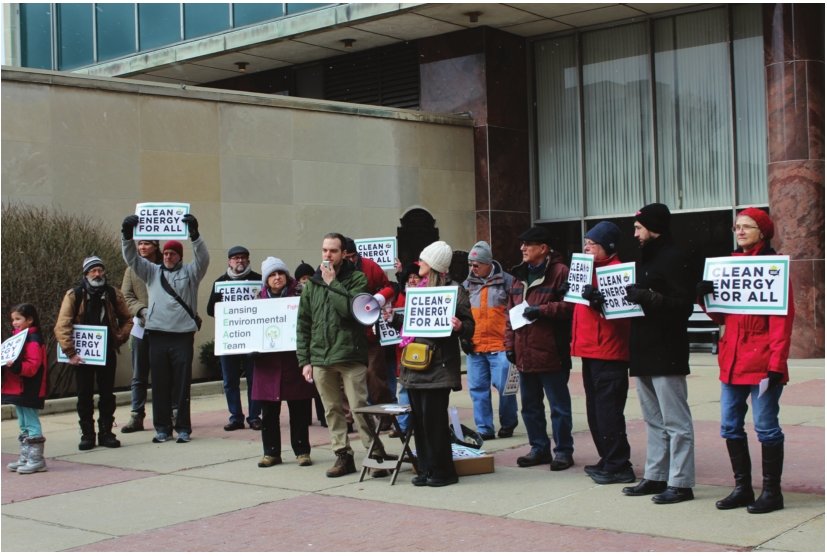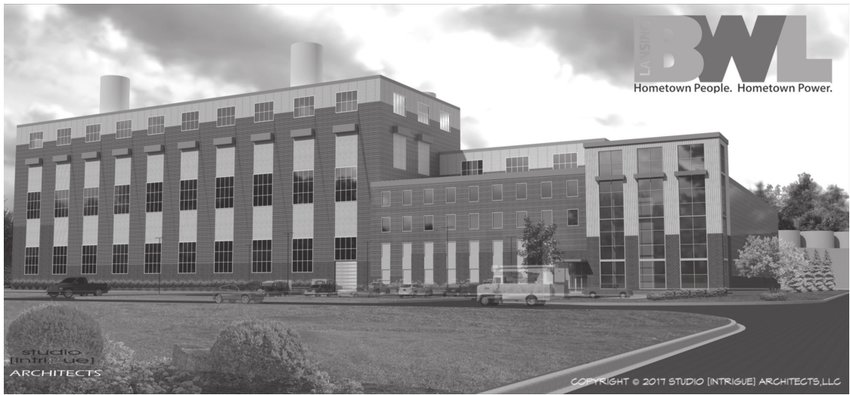
Opponents of the Lansing Board of Water and Light’s plan to build a $500 million gas plant have opened up a pipeline of communication to the BWL board, with the help of a commissioner representing the city’s First Ward.
“I feel confident it’s the best plan and I support building it 100 percent, but I’m willing to listen,” Commissioner Dennis Louney said. “We’re trying to build a fluid model. It’s not ‘we build this, this is what we’re doing, and good luck, everybody.”
He cautioned that he does not speak for the entire board and met with opponents of the plan March 5 “out of respect for them.”
Louney noted that earlier this month, he also sat down with a homeowner who was upset about squirrels displaced by drastic tree trimming.
“She’s passionate about the squirrels,” Louney said.
The Lansing Environmental Action Team, or LEAT, has bigger squirrels to fry. The group has grown to over 100 members since the BWL announced its plans to build the plant in December, according to LEAT member Anna Fisher. About 30 members rallied in front of City Hall March 12 to oppose the BWL’s plan. The state’s Sierra Club chapter also opposes the plant.
A growing coalition of environmentalists, utility experts and ratepayers are trying to dissuade the BWL from committing to large-scale fossil fuel use for another generation when the cost of renewable energy and storage is plunging to unprecedented lows.
“We think it’s astonishingly misguided, but we’re going to continue to try to work with them,” Fisher said.
Fisher said the timing of BWL’s announcement, in late December, made it harder for opposition to gaintraction at first.
“It was the peak of the holidays and people weren’t paying attention,” she said. However, since then, a joint meeting of the BWL board and the Lansing City Council Feb. 15 drew 80 people and 30 speakers opposing the plant.
“It’s invigorating to see such a positive response from the community,” Fisher said. Andrew Sarpolis, organizer of the Sierra Club’s Beyond Coal campaign, was at the meeting with Louney March 5, along with two members of LEAT. Sarpolis’ takeaway was mixed.
“I found BWL staff to be open, and that’s not the case with every utility,” Sarpolis said. “At the same time, they seem pretty committed to building the gas plant.” LEAT is fired up to fight the plant, with more heat expected at the BWL Commission meeting Tuesday, but the Sierra Club is showing signs of a strategic pivot.
A fresh dialogue with BWL, Sarpolis said, should be more nuanced than a confrontation over the proposed plant.
“We will continue to oppose the plant and ask for alternatives, but I think we can do that in the context of some larger negotiations that might get the BWL’s gears to turn a little bit” on a long-term vision, he said.
That vision, in Sarpolis’ view, should be coordinated with Lansing’s resolution to develop a climate action plan this year. Two City Council members, Kathie Dunbar and Peter Spadafore, are meeting bimonthly with LEAT members as the plan develops.
“This gas plant is just a piece, and it’s not fitting together with anything,” Sarpolis said. Responding to a request made by Louney at the March 5 meeting, LEAT is drawing up a list of 10 “asks” it will submit to the BWL.
A draft document the group shared with City Pulse Tuesday calls for the utility to scale down the proposed 170MW natural gas plant, which would include self-contained units called “peakers,” to smaller, modular units that can be used to back up renewables. LEAT also wants the BWL to use “all source bidding,” including renewables and energy efficiency, to meet its future needs.
“Other jurisdictions are already canceling plans for new gas peakers because these other options are proving capable of beating the peakers in head-to-head competition,” the draft reads. Louney said the BWL will start to review its strategic plan next year, but that’s after the first shovelfuls are expected to turn on the new plant.
“We recognize it’s a business model that’s changing because of renewables and battery storage that could change the game,” Louney said.
With the coal-fired Eckert and Erickson plants retiring in 2021 and 2025, respectively, there’s no getting around building one more large-scaled baseload generator, Louney said.
“We’ve got federal capacity requirement we have to meet,” Louney said. “We have to get power if everybody turns on their air conditioner at once.” Louney told the opponents of the plant March 5 that if they don’t like the direction the BWL is going, they can lobby for commissioners who are more sympathetic to their goals. Chairman David Price’s and Second Ward Commissioner Beth Graham’s terms expire June 30.
“If you’re not getting responses from people, push to get someone who’s going to talk to you,” Louney said.

“There are some on the board who are not as active and don’t want to be.”
Louney’s own term at the BWL expired in June last year, but commissioners stay on the board until their appointments are renewed or they are replaced. Mayor Andy Schor approved Louney’s re-appointment but the City Council has not taken it up yet.
Louney was also appointed to the Ingham County Board of Commissioners in February to fill the seat left vacant at the beginning of the year, when Schor named former Commissioner Brian McGrain to be the city’s director of economic development and planning.
Louney is running for a full term as county commissioner this year. He didn’t say if he would step down as BWL commissioner if elected.
“Let’s just say I’ll consider the workload and would re-evaluate it at the end of this year,” he said.
BWL Commissioners meeting
5:30 p.m. Tuesday, March 27, Reo Town Depot conference room
Support City Pulse - Donate Today!
Comments
No comments on this item Please log in to comment by clicking here